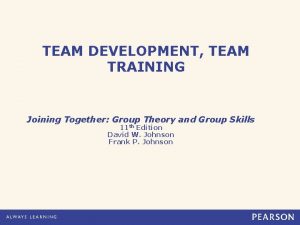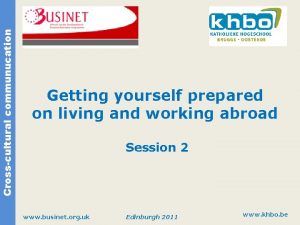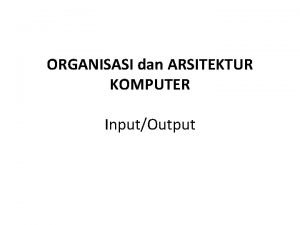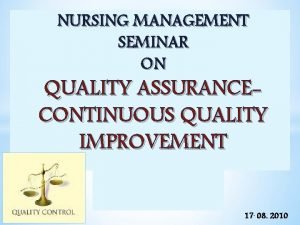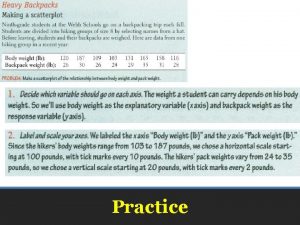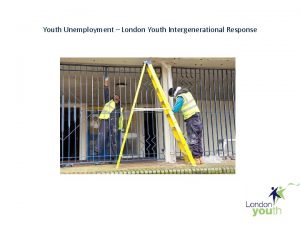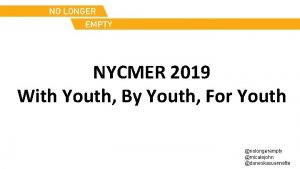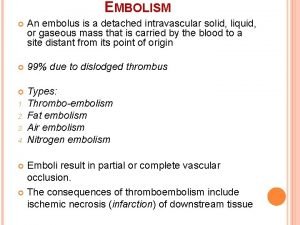Improve the quality of detached youth work practice















- Slides: 15

Improve the quality of detached youth work practice in the UK through its support; promotion and development Advance the education and training of persons involved in detached youth work in the UK Improve understanding of detached youth work and its values in diverse policy arenas, other professional fields and wider society

Detached youth work is: • A model of working with young people in ‘their territory’ or space • Is based in communities (streets, open spaces and parks, shopping centres, estates) • Can use a mobile vehicle • Is based on building trusting relationships with young people • Power is not so dominant in these relationships due to the geographical flexibility • Often with young people who have chaotic and complex lifestyles that are focused on street based activities (ASB, gangs, homelessness, substance abuse, poor mental health, poor sexual health choices) • Witnessing young people’s lives in spaces that may not normally be seen • Can be in conflict with other groups in the community • Based on negotiation

We know: • Only approx. 5% of ‘vulnerable’ young people are going to school • Domestic abuse reporting has risen • Families in lockdown are rubbing up against each other which can increase conflict and escalate poor relationships • Police recording of ASB has raised and is often associated with young people being reported by other groups in the community • Some services and boroughs are working and delivering detached sessions • MASH referrals are down because the largest number of referrals come from schools/education providers

We also know: • Young people are resilient • They can make sensible and situationally appropriate choices • They are tech savvy so can connect socially with their friends and peers • We can continue to make safeguarding and early help referrals as normal if we are concerned about young people and families • We know across London (and the UK) there a range of approaches being taken to the changes in working practice for youth workers

Detached youth work teams should: • Review and up-date Health and Safety documentation, especially that related to risk assessment, consider government and Public Health England advice • Keep up to-date with changes in restrictions to movement; these will likely be different in different areas. • Do reconnaissance of the areas you are planning to work in • Make contact with your local community hub, services and partner organisations e. g. police, libraries, Children and Social Care and Early Help, community groups, voluntary organisations, faith groups etc. and discuss with them your intentions so as not to duplicate services • Ensure an experienced detached worker accompanies those inexperienced or new to working in street-based settings • Always work with a minimum of one other colleague, never alone • Have a withdrawal plan /exit strategy. Make sure all who are working are familiar with it and be clear about the situations where it may need to be used • Commit to planning, recording, evaluating, and reviewing your work, to inform future practice

Kit list, to include: • A fully charged mobile phone (ideally a work phone) with direct numbers for colleagues and your line manager/s • ID cards (ensure they are visible) and any permission to work slip from your local hub or the police • Your youth worker ‘uniform’, labelled as appropriate (if you use it) • Hand sanitiser, tissues, wet wipes and any other locally agreed personal protective equipment (PPE) • Hub/Police permissions • PPE, as directed by your organisation/local authority (at the very least, a supply of gloves and face masks to use at practitioners’/managers’ discretion) • Sealable plastic bags (to dispose of used PPE) • Multiples of anything you typically use / may give to young people to use (e. g. more paper and pens so you can give them away rather than collect back) • Local mutual/council information leaflets/publicity In practice: • Remember, dynamic (in the moment) risk assessments are more important than ever • Observe and demonstrate social (physical) distancing • Observe where young people are and the size of the group they are in • Consider the presence of other members of the public in the same location, especially those who may be vulnerable or over 70 • Be attentive to any COVID 19 symptoms displayed by young people, colleagues and the wider public

There is a moral imperative to support messaging that helps people keep safe. Effective detached youth work demands thinking carefully about how to engage and what to say to different young people who are outside. Workers have found a reasonably assertive position works with some “You should go home. ” For others asking questions and having a conversation is much more appropriate “Are you staying safe? ”. Specific interventions need to be guided by the quality of relationships, time, place and professional judgement. Conversations are kept to a minimum; this also ensures that detached youth work cannot be interpreted as giving young people cause to leave their homes in order to congregate.

Youth workers are relatively high on the list of workers at risk of contracting the virus at work. But the risk is significantly lower for detached workers. Working outside makes social distancing relatively easy and workers have realised they are role models. The way they behave e. g. standing two meters apart helps young people learn as much as saying it. Outdoor learning is increasingly recognised as being relatively riskfree. Detached workers have become active promoters of this important and valuable form of education by organising street dancing, and socially distanced exercise sessions.

It is important to recognise, value and support informal community work. A detached worker in London describes observing a community elder in conversation with a group of young men outside a row of shops “All were at a safe distance from each other and were clearly enjoying spending time together. ” Observant workers have always been aware of the important role a wide range of people from community activists to barbers and shop-keepers can play in their communities. Significantly barber shops and takeaways have the potential for more than a moment of interaction and are settings many young people regard as safe spaces. Quite a few continue to engage young people even though their premises are closed. Noting these people and places are important in detached work. They have reminded us how important communities are both in terms of people and places that are accessible to young people, many of whom may be vulnerable. The Croydon barbers helping the BME community speak about mental health

COVID 19 hubs have sprung up in almost all localities, they provide invaluable support and help keep people connected. Some analysis of their reach is needed. Detached workers have an important role to play in encouraging the hubs to think critically about the messages they are sending out and whether these messages and the services they offer are accessible to all in the community. Discussion about cultural issues, about language and perhaps the need for translation may be needed. Detached workers’ knowledge of an area both in terms of people and physical geography, may also be invaluable at this time. They can also get involved in the direct delivery of services, food, medicine etc. and encourage and coordinate the volunteering of others, including young people. A detached worker in South East London, for example, was able to point out local council and housing association estates and other high-density multi-occupancy properties had not been leafleted and help ensure this happened. It is important, especially at this time that workers help identify gaps, act as a link between initiatives like the hubs and local communities and negotiate where necessary in order to bridge these gaps.

Support services are crucial to young people, their families and carers and communities right now Adapting to new and fast changing situations is a core principle of detached youth work Plan and prepare. . . spend time working as a team and accessing training that can move your work forward.


Time & Location 29 May, 14: 00 – 15: 30 Zoom About the Event This is a joint seminar with the Federation for Detached Youth Work, and the GLA. This event will focus on the best practice guidance around detached work, a funders response to detached work from Erik Mesel at John Lyons and case studies of groups undertaking this approach across London as part of their Covid 19 response. This seminar will be followed up by a series of training sessions by the Federation of Detached Youth Work. These dates will be circulated shortly.

Federation for Detached Youth Work hosted webinars Time & Location UK practitioners ‘a view from the streets’ 10 th June , 14: 00 – 15: 30, zoom International practitioners ‘where are we now’ 7 th June, 14: 00 – 15: 30, zoom Training These webinars will be followed up by a series of training sessions on a pay person basis (UK and International), info can be found on our website, Eventbrite and social media sites.

+ info@fdyw. org. uk + emily@fdyw. org. uk ( 07804 223485 @detachedwork @Fed. Detached. YW
 Joining together as a team to improve the quality
Joining together as a team to improve the quality Theories of personality in consumer behaviour
Theories of personality in consumer behaviour 8237 dma
8237 dma Detached communication style
Detached communication style Teknik yang digunakan cpu dalam menangani program interupsi
Teknik yang digunakan cpu dalam menangani program interupsi Detached greenhouse
Detached greenhouse Attached and detached pronouns in arabic
Attached and detached pronouns in arabic Hydrostatic equilibrium
Hydrostatic equilibrium Nose hair color
Nose hair color Marie tolstrup
Marie tolstrup London youth quality mark
London youth quality mark Youth work outcomes
Youth work outcomes Perform quality assurance
Perform quality assurance Plan quality management pmp
Plan quality management pmp Pmbok quality assurance vs quality control
Pmbok quality assurance vs quality control Quality assurance model in nursing management
Quality assurance model in nursing management
